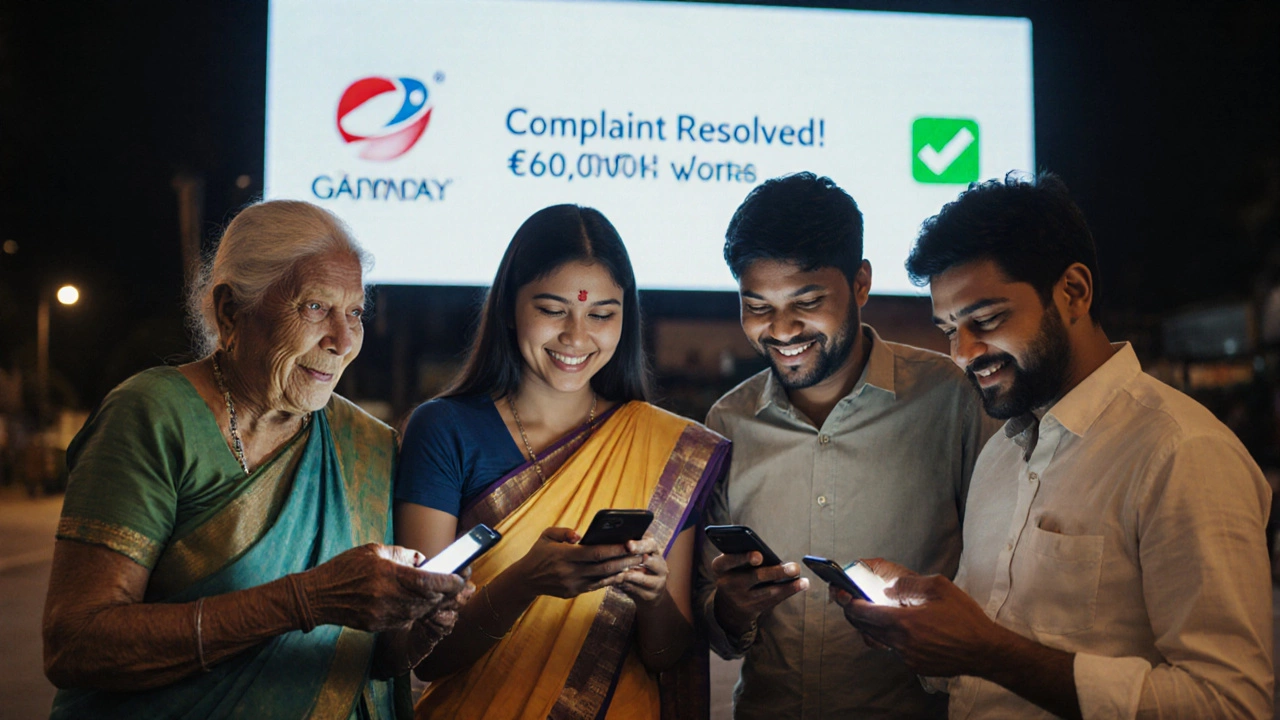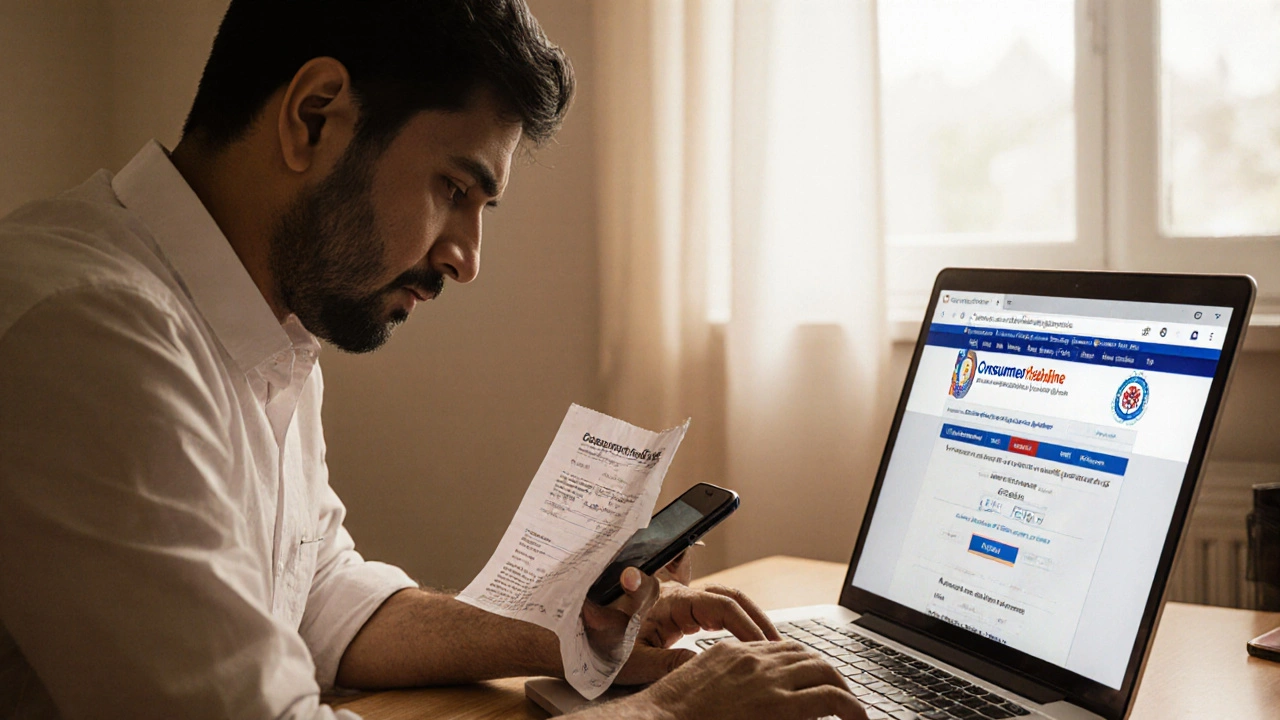Consumer Complaint Jurisdiction Calculator
Which Consumer Commission Should You File With?
Determine the correct court for your consumer complaint based on your claim amount and complaint type.
Claim Amount:
The Commission handles claims between and
This is where you should file your complaint based on your claim amount and complaint type.
How to File
Once you determine the correct commission:
- Visit consumerhelpline.gov.in
- Click "File a Complaint" and register with your mobile number
- Enter your claim amount to be automatically routed to the correct commission
- Upload your proof and submit your complaint
Every year, over 12 million consumer complaints are filed in India. That’s not just numbers-it’s real people stuck with faulty phones, fake weight loss products, delayed flights, and hidden charges on their electricity bills. If you’ve ever felt powerless against a company that won’t listen, you’re not alone. The good news? India has one of the most accessible consumer protection systems in the world-and you don’t need a lawyer to use it.
What Counts as a Valid Consumer Complaint?
A consumer complaint in India isn’t just about being unhappy. It has to meet three legal conditions under the Consumer Protection Act, 2019. First, you must have bought a product or hired a service. Second, the product must be defective, or the service must be deficient. Third, the issue must involve loss or damage-like money wasted, health risks, or time lost.
Examples? A refrigerator that stops working after 45 days. A gym membership you paid for but never got access to. A flight canceled without refund. A medical test that gave wrong results. All of these qualify. But if you just didn’t like the taste of a snack? That’s not a legal complaint.
The law protects anyone who buys goods or services for personal use-not for resale or commercial purposes. So if you bought a laptop for your kid’s online classes, you’re covered. If you bought 50 laptops to resell, you’re not.
Where to File a Complaint: The Three-Tier System
India’s consumer dispute system is built like a pyramid. You start at the bottom and move up only if needed.
- District Commission: Handles cases up to ₹50 lakh. This is where 90% of complaints begin. You file here if you lost ₹10,000 on a broken AC or ₹40 lakh on a faulty car.
- State Commission: Deals with claims between ₹50 lakh and ₹2 crore. Think of this for high-value items like home renovations gone wrong or medical negligence involving lakhs in losses.
- National Commission: Only for cases above ₹2 crore. This is rare-usually reserved for large-scale frauds or nationwide service failures.
You don’t need to guess which one to pick. The online portal asks for your claim amount and auto-directs you. No confusion. No lawyers needed.
How to File a Complaint Online (2025 Process)
Filing a complaint in India is now faster than ordering food online. Here’s how:
- Go to consumerhelpline.gov.in (the official government portal).
- Click on “File a Complaint” and register with your mobile number.
- Select the type of complaint: product, service, digital, or e-commerce.
- Fill in details: name, address, product/service name, date of purchase, issue description, and amount claimed.
- Upload proof: bill, receipt, WhatsApp chat with customer care, photo of defect.
- Submit. You’ll get a unique complaint ID within minutes.
The system automatically sends a notice to the company. They have 30 days to respond. If they ignore it, the case moves to a hearing. No court visits needed unless you’re called.
What Happens After You File?
Once you hit submit, here’s what you can expect:
- Days 1-7: The company gets a notice. Many settle here just to avoid bad publicity.
- Days 8-30: They respond. If they offer a refund or replacement, you can accept it and close the case.
- Days 31-60: If no resolution, a hearing date is set. You’ll get a video call link or a physical hearing notice.
- After Hearing: The commission gives a decision within 30 days. It’s legally binding.
Most cases are resolved in under 90 days. In 2024, over 72% of complaints filed online were settled without a physical hearing. Companies hate losing in consumer court-it hurts their brand more than paying up.

What Can You Get as a Resolution?
The consumer court doesn’t just say “sorry.” You can get:
- Full refund of money paid
- Replacement of defective product
- Compensation for mental harassment or financial loss
- Costs of legal notice or expert opinion
- Stoppage of unfair trade practices
In 2023, the National Commission ordered a major e-commerce platform to pay ₹1.2 crore in compensation to 12,000 customers who received counterfeit cosmetics. That’s ₹1,000 per person-plus a public apology.
You can also ask for punitive damages if the company acted fraudulently. For example, if a company sold expired medicine and hid the date, the court can force them to pay extra-sometimes up to 10 times the loss.
Common Mistakes People Make
Most complaints fail not because the law is weak-but because people skip simple steps.
- Not keeping receipts: A bill or invoice is your proof. If you paid in cash and have no slip, your case weakens.
- Waiting too long: You have two years from the date of purchase to file. After that, the court won’t hear you.
- Trying to negotiate forever: If the company says “we’ll look into it” for six months, file the complaint anyway. Silence = rejection.
- Using the wrong forum: Don’t file a ₹10 lakh claim in the District Commission. It’ll get sent back, wasting time.
Pro tip: Save every email, chat, and call record. Even a voice note saying “We’ll refund you next week” can be used as evidence.
Free Help Is Available
You don’t need to pay a lawyer. The government runs Consumer Protection Councils in every district. They offer free legal aid, help filling forms, and even send representatives to hearings if you’re elderly or disabled.
There’s also a toll-free helpline: 1915. Call anytime. Someone will guide you in your language-Hindi, Tamil, Bengali, Marathi, or English.
Many NGOs like Consumer Unity & Trust Society (CUTS) and Consumer Voice also offer free templates and workshops. Google their name + your city.
What If the Company Doesn’t Comply?
Let’s say the court orders a refund, but the company still won’t pay. That’s when things get serious.
The consumer court can:
- Impose a fine of up to ₹10 lakh on the company
- Order imprisonment for up to 3 years for repeated fraud
- Issue a public notice on their website and social media
- Block their GST registration
In 2024, a Delhi-based fitness brand was banned from selling online after ignoring three court orders. Their website went down. Their ads were pulled. Their CEO was summoned by the State Commission.
Companies learn fast when their entire business is on the line.

Special Cases: Online Shopping, Digital Services, and Subscription Traps
Most complaints today are about online platforms.
- Amazon, Flipkart, Myntra: If you didn’t get the product you ordered, or it’s damaged, you have 10 days to return it. If they refuse, file a complaint with the Online Dispute Resolution (ODR) portal linked on the app.
- Netflix, JioCinema, Disney+ Hotstar: If you’re charged after canceling, or your account is suspended without reason, file a complaint. These are “services,” and courts treat them seriously.
- Subscription traps: Many apps hide auto-renewal in small print. The law says they must confirm renewal 7 days before charging. If they didn’t, you can get a full refund for all unauthorized charges.
In 2025, the government made it mandatory for all apps to show a pop-up: “You are about to be charged ₹499. Confirm to continue.” No more sneaky billing.
Real Stories That Won
Here’s what real people got:
- A woman in Pune bought a ₹45,000 air purifier. It made her son’s asthma worse. She filed a complaint. Got ₹60,000 back-plus ₹10,000 for medical bills.
- A student in Hyderabad paid ₹2.5 lakh for a coaching course that never started. The court ordered a full refund plus ₹50,000 for lost time.
- A man in Bangalore bought a used car. The seller hid accident damage. He filed. Got the car returned and ₹3 lakh in compensation.
These aren’t rare. They happen every day.
What’s Changing in 2025?
The system is getting faster and smarter:
- AI-powered chatbots now help draft complaints in 12 languages.
- Companies must respond within 15 days (down from 30).
- Consumer courts now accept WhatsApp screenshots and video evidence.
- First-time complainants get priority hearings.
The goal? Reduce resolution time to under 60 days by 2026. India is betting big on consumer trust.
Final Tip: Don’t Wait. Act.
Consumer rights in India aren’t a privilege. They’re your legal right. Every complaint you file makes it harder for bad businesses to keep doing what they do. You’re not just protecting yourself-you’re protecting the next person who buys from the same company.
So if you’ve been wronged, don’t shrug it off. Take 15 minutes. Go to consumerhelpline.gov.in. File it. You’ve got nothing to lose-and everything to gain.
Can I file a consumer complaint without a bill?
Yes, but it’s harder. You can use bank statements, email confirmations, WhatsApp chats with the seller, or even witness statements. The court accepts indirect proof if it’s consistent. But always keep your bill-it’s the strongest evidence.
How long does a consumer court case take?
Most cases are resolved in 60 to 90 days. If the company cooperates, it can be done in 30 days. Only complex cases involving large companies or multiple parties take longer-sometimes up to 6 months. But you don’t need to wait around. The system sends updates via SMS and email.
Do I need a lawyer to file a consumer complaint?
No. The entire process is designed for ordinary people. You can file online yourself in under 10 minutes. Free legal aid is available if you need help filling forms or preparing for a hearing. Lawyers are optional-unless you’re claiming over ₹1 crore and want extra support.
Can I complain about a government service?
Yes. If you paid for a government service and it was poorly delivered-like a delayed ration card, wrong electricity bill, or broken public water connection-you can file a complaint. The Consumer Protection Act covers both private and public services that are paid for.
What if the company is based outside India?
If you bought from an international company that ships to India-like Amazon US, Apple, or Nike-the Indian consumer court can still hear your case. The law applies to any seller who delivers goods or services to an Indian consumer. You’ll need proof of delivery to your address. Many foreign companies now comply because they don’t want their names on India’s public complaint registry.
Can I file a complaint for a service I didn’t pay for?
No. The Consumer Protection Act only covers paid services. If you got free customer support and it was rude, you can’t file a complaint. But if you were promised free service as part of a warranty and they refused, that counts. The key is: was there a contract, even if no money changed hands?
Is there a fee to file a complaint?
Yes, but it’s very low. For claims up to ₹5 lakh, the fee is ₹100. For claims between ₹5 lakh and ₹10 lakh, it’s ₹200. For higher claims, it’s 1% of the claim amount, capped at ₹5,000. If you’re below the poverty line, you can apply for a fee waiver.
Can I file a complaint against a doctor or hospital?
Yes, but only if the case involves deficiency in service-not medical opinion. If a hospital lost your records, overcharged you, or refused treatment after payment, you can file. But if the treatment didn’t work and you believe the doctor made a mistake, that’s a medical negligence case, which goes to civil court. Consumer courts don’t handle malpractice claims.
